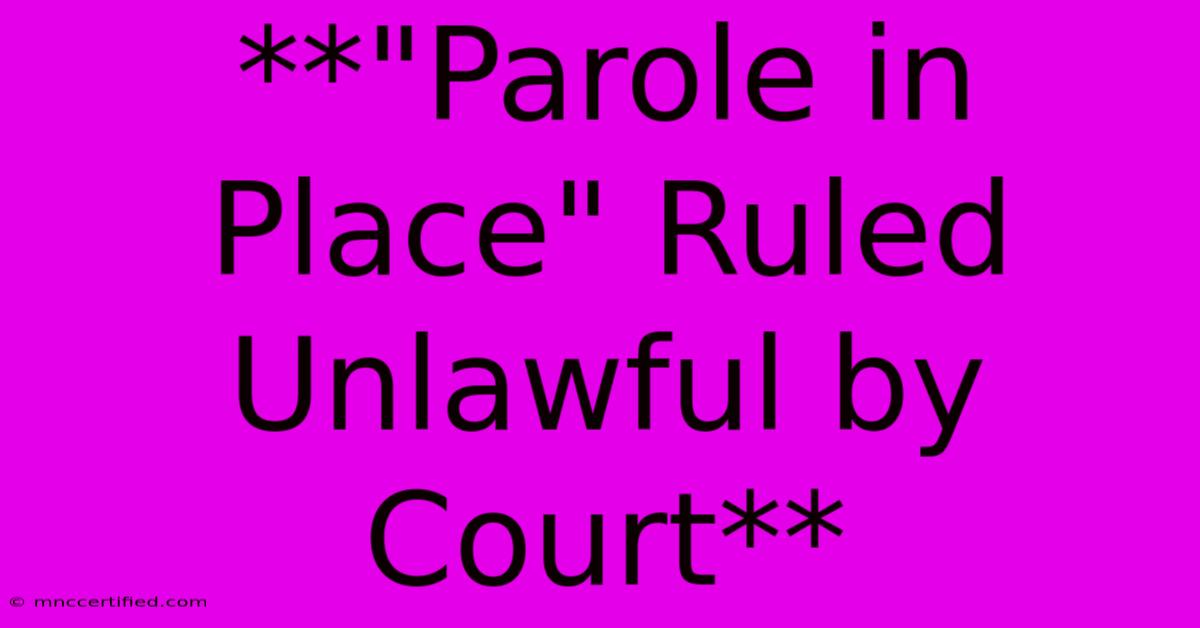**"Parole In Place" Ruled Unlawful By Court**

Table of Contents
"Parole in Place" Ruled Unlawful by Court: What This Means for Sentenced Individuals
The concept of "parole in place" – where individuals sentenced to prison could serve their time at home or in the community under specific conditions – has been a subject of debate for years. Recently, a landmark court ruling has declared this practice unlawful, raising significant questions about the future of alternative sentencing options.
The Court's Ruling and Its Impact
The ruling, issued by [Insert Court Name] in [Insert Location], found that "parole in place" programs violate the fundamental principles of justice and due process. The court argued that:
- Sentencing must be consistent: Allowing individuals to serve their sentences outside of a correctional facility undermines the principle of equal justice and undermines the authority of the court.
- Public safety concerns: The court expressed concerns about the potential for individuals granted "parole in place" to re-offend or pose a danger to the community.
- Lack of oversight and accountability: The court emphasized the importance of oversight and accountability within the prison system, which is difficult to ensure with "parole in place" programs.
This ruling has far-reaching implications for individuals currently serving sentences and for future sentencing practices.
Implications for Sentenced Individuals
For individuals currently enrolled in "parole in place" programs, the ruling means that they may be required to return to a traditional prison setting. This could disrupt their lives, disrupt their families, and potentially impede their rehabilitation efforts.
Alternative Sentencing Options: Where Do We Go From Here?
While "parole in place" has been deemed unlawful, the court ruling doesn't necessarily mean the end of alternative sentencing options.
Moving forward, alternative sentencing options will need to be carefully evaluated and designed to address the concerns raised by the court. This could include:
- Expanding community corrections programs: Programs that provide rehabilitation and support services while individuals are still living in the community under strict supervision.
- Increased emphasis on re-entry programs: Programs that help individuals transition back into society after serving their sentence.
- Continued development of restorative justice programs: These programs focus on repairing harm caused by crime and involve the victim, the offender, and the community.
The debate around alternative sentencing options is complex and multifaceted. While the recent court ruling represents a setback for proponents of "parole in place," it also presents an opportunity to refine and strengthen alternative sentencing programs that truly serve the needs of justice, rehabilitation, and public safety.
It's important to stay informed about developments in this area and to advocate for sentencing practices that are fair, effective, and prioritize the well-being of all involved.

Thank you for visiting our website wich cover about **"Parole In Place" Ruled Unlawful By Court**. We hope the information provided has been useful to you. Feel free to contact us if you have any questions or need further assistance. See you next time and dont miss to bookmark.
Featured Posts
-
Heavy Rains Cause Flooding In Spain
Nov 09, 2024
-
Bronny James G League Debut Sold Out
Nov 09, 2024
-
Fridays November Ireland Vs New Zealand Live Score
Nov 09, 2024
-
Title Ix Probe Targets Florida Coach Golden
Nov 09, 2024
-
South Africa Falls To India In 1st T20
Nov 09, 2024